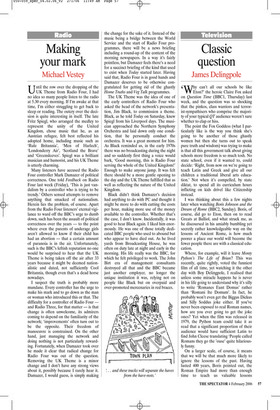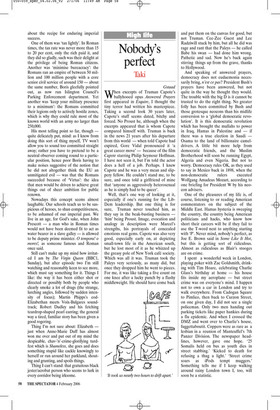Classic question
James Delingpole
‘Why can’t all our schools be like Eton?’ the heroic Claire Fox asked on Question Time (BBC1, Thursday) last week, and the question was so shocking that the pinkos, class warriors and terrorist-sympathisers who comprise the majority of your typical QT audience weren’t sure whether to clap or hiss.
The point the Fox Goddess (what I particularly like is the way you think she’s going to be another of those ghastly women but then she turns out to speak pure truth and wisdom) was trying to make is that all this government talk about giving schools more freedom is so much tosh. No state school, even if it wanted to, could decide: ‘Right, from now on we’re going to teach Latin and Greek and give all our children a traditional liberal arts education.’ Not when it’s compelled, by state diktat, to spend all its curriculum hours inflicting on kids drivel like Citizenship instead.
I was thinking about this a few nights later when watching Boris Johnson and the Dream of Rome (BBC2, Sunday). Boris, of course, did go to Eton, then on to read Greats at Balliol, and what struck me, as he discoursed in his amiably bumbling yet secretly rather knowledgeable way on the lessons of Ancient Rome, is how much poorer a place our world will become the fewer people there are with a classical education.
Where, for example, will it leave Monty Python’s The Life of Brian? This was recently, quite rightly, voted the funniest film of all time, yet watching it the other day with Boy Delingpole, I realised that unless some miracle happens he is never in his life going to understand why it’s silly to write ‘Romanes Eunt Domus’ rather than ‘Romani Ite Domum’. In fact, he probably won’t even get the Biggus Dickus and Silly Soddus joke either. If you’ve never been exposed to real Roman names, how are you ever going to get the joke ones? Yet when the film was released in 1979, the Python team could take it as read that a significant proportion of their audience would have sufficient Latin to find John Cleese translating ‘People called Romans they go the ’ouse’ quite hilariously funny.
On a larger scale, of course, it means that we will be that much more likely to ignore the lessons of the past. Having lasted 400 years, Boris pointed out, the Roman Empire had more than enough time to teach us valuable lessons about the recipe for enduring imperial success.
One of them was ‘tax lightly’. In Roman times, the tax rate was never more than 15 to 20 per cent, only the rich paid it, and they did so gladly, such was their delight at the privilege of being Roman citizens. Another was ‘minimise bureacracy’: the Romans ran an empire of between 50 million and 100 million people with a core senior civil service of around 150 — about the same number, Boris gleefully pointed out, as now run Islington Council’s Parking Enforcement department. Yet another was ‘keep your military presence to a minimum’: the Romans committed their legions only to actively hostile zones, which is why they could rule most of the known world with an army no larger than 250,000.
His most telling point so far, though quite delicately put, mind: as I know from doing this sort of thing myself, TV won’t allow you to sound too committed straight away; rather you have to pretend to be a neutral observer coming round to a particular position, hence poor Boris having to make noises suggestive of the notion that he did not altogether think the EU an unmitigated evil — was that the Romans succeeded because of ‘Virtus’: the idea that men would be driven to achieve great things out of sheer ambition for public renown.
Nowadays this concept seems almost laughable. Our schools teach us to be suspicious of heroes, to shun competitiveness, to be ashamed of our imperial past. We live in an age, for God’s sake, when John Prescott — a man who in Roman times would not have been deemed fit to act as water bearer in a slave galley — is allowed to be deputy prime minister. O tempora! o mores!, as someone famous and Roman once said.
Still can’t make up my mind how irritated I am by The Virgin Queen (BBC1, Sunday), but after episode two I’m still watching and reasonably keen to see more, which must say something for it. Things I like: the way it has been either shot or directed or possibly both by people who clearly smoke a lot of drugs (the strange, lurching angles, followed by sudden intensity of focus); Martin Phipps’s codElizabethan meets Voix-Bulgares soundtrack; Robert Dudley and his fetching teardrop-shaped pearl earring; the general way a tired, familiar story has been given a good rogering.
Thing I’m not sure about: Elizabeth just when Anne-Marie Duff has almost won me over and put out of my mind the despicable, chav-’n’-crime-glorifying turdfest which is Shameless, she goes and does something stupid like cackle knowingly to herself or run around her parkland, shouting and grunting, and spoils things.
Thing I can’t stand: that gratuitous black jester/acrobat person who seems to lurk in every corridor being irksome.






























































































































 Previous page
Previous page